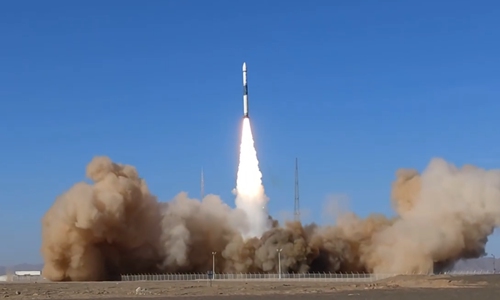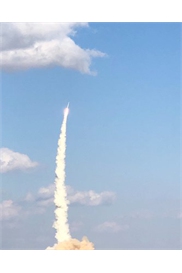SOURCE / INDUSTRIES
China's commercial space sector hardly impacted by COVID-19, except in Wuhan

China’s solid-fueled KuaiZhou-1A (KZ-1A) Y11 carrier rocket blasted off at 11:40 am on November 13, 2019. Photo: Screenshot of video from China's CCTV News
Compared with traffic-dependent industries including catering, aviation, and tourism, the nation's fledging commercial space has not been severely disrupted by the outbreak of novel coronavirus (COVID-19) which has claimed over 3,000 people nationwide as it continues to spread globally. However, the epidemic's impact on Wuhan, the epicenter, is still very obvious, industry insiders told the Global Times.
"The team of Kuaizhou rockets under the state-owned China Aerospace Science and Industry Corp (CASIC) as well as its relevant suppliers have forged a major force in Wuhan [in Central China's Hubei Province]," said an industry investment manager who asked to remain anonymous.
The Kuaizhou-1A solid-propellant rockets, developed by Expace Technology are a subordinate to the CASIC, and will mainly be used to launch low-orbit microsatellites.
A Kuaizhou-1A carrier rocket lifted the Galaxy-Space 1, China's first 5G-capable satellite built by a private Chinese company, at the Jiuquan Satellite Launch Center on January 16.
The company completed its first mission, launching eight to nine rockets, at the beginning of the year. For the first half of 2020, the company was scheduled to conduct four or five launches, a PR representative told the Global Times in December.
Given the ongoing epidemic, it seems unlikely to meet the target for the Wuhan-based firm as the city has been under a lockdown for over 40 days, an Expace source told the Global Times on the condition of anonymity.
"As far as I know, the epidemic has pressed a halt button for its rocket production. Even though the product is finished manufacturing, it cannot be transported under the lockdown, which means that original plans on production and launch have to be adjusted," the source said.
"If Expace and its relevant suppliers cannot recover soon, Wuhan's commercial space sector has to take further blow," he added.
It is acknowledged that the Kuaizhou rocket and its related industrial layout have played a significant role in supporting Wuhan's commercial space development as the city has been ramping up efforts to develop its commercial space industry in recent years.
The city started in 2016 to build the country's first commercial space industry base - the Wuhan National Space Industry Base, and is focused on the development of carrier rockets and satellites, commercial launch services, and applications of satellite data.
The first-phase facility of the base's rocket industrial park has completed construction and is scheduled for December. While the satellite park was under full-speed construction, which was original scheduled to put into operation this year, local newspaper Chutian Metro Daily reported in November.
Waiting to take off
So far since the Spring Festival holidays, none commercial launch has been completed in China.
The commercial space firms outside of Hubei - some players backed by stated-owned enterprises while others from the private sector - have not been affected severely by the epidemic.
Yao Bowen, vice president of private rocket firm iSpace, told the Global Times that the firm had resumed work at full capacity in its Beijing headquarters while conducting strict precaution measures against the spread of the virus. While its research and development (R&D) branch in Xi'an, capital of Northwest China's Shaanxi Province, has realized a 90 percent resumption rate.
"The epidemic period with strict precaution measures has caused our daily work to be less efficient and convenient, but it has limited the impact on our business and rocket development," said Yao.
"We met some difficulty with component supplies last month as the supplier is located in Hubei, but it did not cause too much trouble since we have diversified the sources and replaced it quickly," he noted.
The carrier rocket built by iSpace, dubbed China's answer to SpaceX, successfully sent satellites into orbit in July 2019 from the Jiuquan Satellite Launch Center in Northwest China's Gansu Province, a milestone for China's commercial space industry. It was the first private-sector space firm to do so, after two earlier failures of the other two leading rocket start-ups - OneSpace and LandSpace.
"The epidemic won't affect our launch plan set in June in Jiuquan," Yao said, noting that June's launch will realize one rocket carrying 6-7 satellites, and the launch will cooperate with a renowned artist who will play his masterpiece on the surface of the rocket.
A PR representative of LandSpace, another rocket start-up, told the Global Times that its rocket launch timetable for 2020 had not been confirmed due to the epidemic, which has not directly impacted the firm's business.
The Beijing-based firm said its production facility in Huzhou, East China's Zhejiang Province, has resumed work, while its Beijing workplace does not have a high on-site rate.
Different from other industries, rocket firms, and their clients - satellite firms - have strong planning. Hence, their supply chain is not that easy to be disrupted during an epidemic, according to the aforementioned investment manager.
"For instance, satellite firms and their clients who have such market demand of communication, navigation, and remote sensing usually plan their launch time one or two years in advance, and those market demand won't be largely impaired in a short term by the coronavirus," he added.
Huang Zhicheng, a space industry expert, told the Global Times that "we should also look at the other side of the coin, referring to opportunities ahead when the epidemic subsides."
Huang bets the commercial space industry, still in its early phase, will continue to grow and race in the global market.
With over 100 private firms on track, China's commercial space market would reach 800 billion yuan ($125.8 billion) in 2020 compared with $485 billion that the global space market estimated it could reach this year, according to earlier industry forecasts.
As China is now eyeing "new infrastructure" projects such as 5G networks and data centers to offset the economic impact of coronavirus and boost sustainable growth, the commercial sector might benefit from such favorable policy indirectly, said Huang.
"Opportunities will abound for the young sector with more private capital involving in instead of the government-led stimulus," he added.
Chinese private automaker Zhejiang Geely said recently it was investing 2.27 billion yuan in a new satellite manufacturing plant, where it plans to build low-orbit satellites to provide more accurate data for self-driving cars.
Shunwei Capital, the venture capital firm established by Lei Jun, CEO, and chairman of China's technology giant Xiaomi, has invested in four private commercial space sector start-ups, including iSpace and commercial micro-satellites developer Galaxy Space.


